War on the Nile
Text and photos by Ivor Prickett/Panos Pictures
Abridged by Syharn Shen (沈思含)
War on the Nile
Text and photos by Ivor Prickett/Panos Pictures
Abridged by Syharn Shen (沈思含)
A feud between two generals fighting for power in Sudan has dragged the country into civil war and turned Khartoum, the capital and one of the largest cities in Africa, into ground zero for one of the world's worst humanitarian crises.
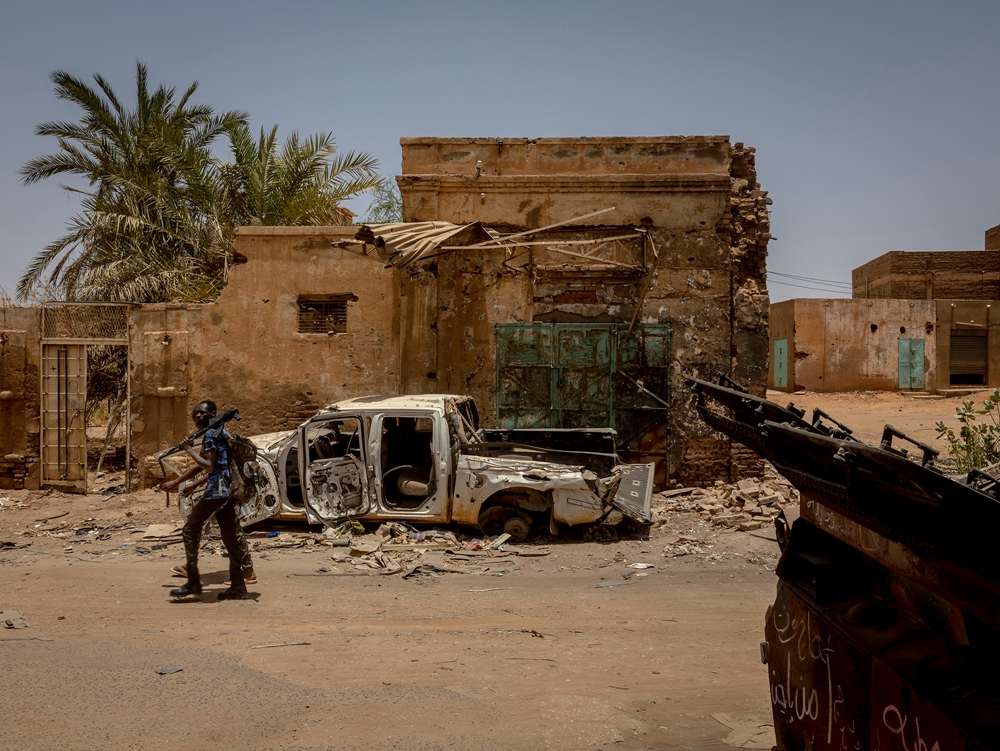
Sudanese Armed Forces soldiers walk through a road lined with destroyed buildings in Al-Shaabi market, liberated from RSF control in March 2024.
Sudan's gold market lies amidst rubble and dog-eaten corpses. State TV has transformed into a torture chamber, and the national film archive's treasures now yellow under the relentless sun. Artillery shells rain over the Nile, demolishing hospitals and homes. Residents bury their dead outside their doors, while others join civilian militias. In a silent famine ward, starving babies fight for life, losing one every few days.
Khartoum, Sudan's capital and one of Africa's largest cities, has become a scorched battleground. A power struggle between two generals has plunged the nation into civil war, turning the city into the epicenter of one of the world's worst humanitarian crises. American estimates place deaths at up to 150,000 since the conflict began last year (2023), with nine million displaced, creating the largest displacement crisis globally, according to the United Nations. A looming famine threatens to kill hundreds of thousands of children, potentially rivaling the Ethiopian famine of the 1980s.
Foreign powers like the United Arab Emirates, Iran, Russia and its Wagner mercenaries, and Ukrainian special forces have turned Sudan into a battleground, each seeking to exploit its resources, such as gold or access to the Red Sea. Samawal Ahmed mourns the needless tragedy as he navigates a looted market, passing damaged jewelry stores and a mangled tank. A year ago, a rocket destroyed his apartment and closed his medical lab. Returning now, he salvages what he can, holding documents from his wrecked home. "I lost everything," he says. "All this could have been avoided."
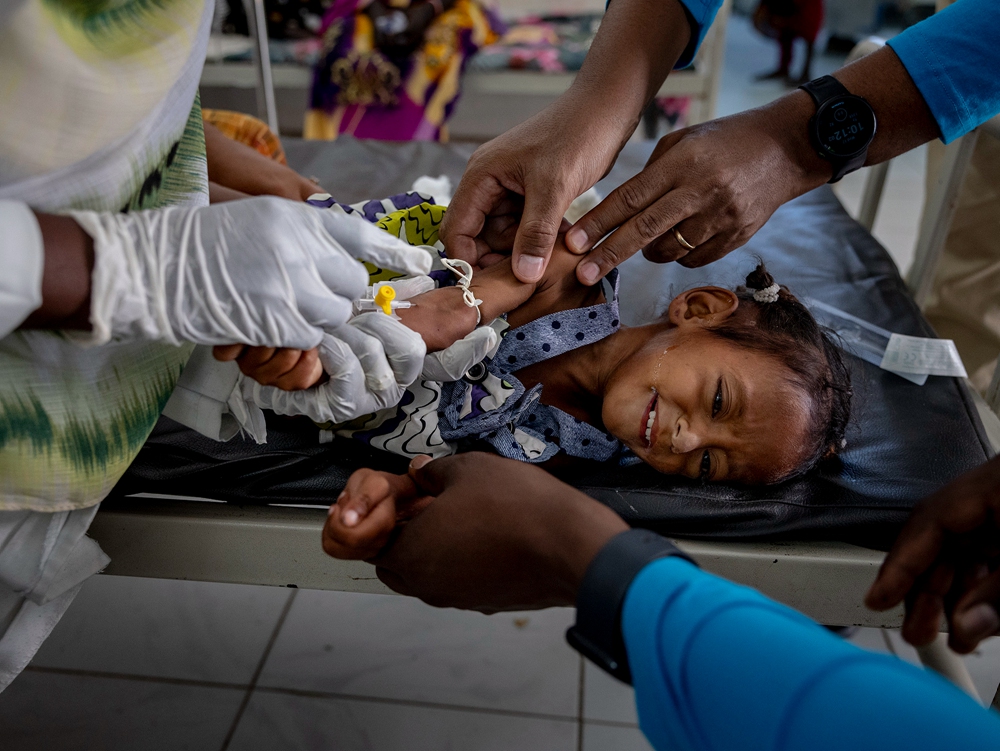
Doctors from UNICEF place a new intravenous cannula in Bara'a Ahmed at the malnutrition center in Port Sudan. Undiagnosed with cholera at the time, her condition later improved, and she was expected to survive.
The war erupted unexpectedly in April 2023 when a standoff between Sudan's military and the Rapid Support Forces (RSF) turned into gunfire in Khartoum. Historically plagued by coups since its 1956 independence, Sudan did not foresee the conflict's longevity. The national army and RSF had jointly seized power in 2021 but clashed over merging their forces, quickly engulfing the country in chaos. The fighting has spread across Sudan, leaving the nation in ruins with neither side able to secure victory, leading to a devastating free-for-all. The crisis threatens regions like Darfur, turning fertile fields into battlezones, collapsing the health system, and inviting numerous armed groups into the conflict.
With American-led peace talks stalled, Sudan's collapse threatens fragile regional stability, risking involvement from neighbors like Chad, Eritrea, or South Sudan. The conflict has global repercussions, with Iran backing forces on both sides, European fears of a Sudanese migrant wave, and U.S. intelligence warning of Sudan as a potential haven for terrorist networks. Approaching Khartoum, artillery sounds and warplanes overhead punctuate the scene. Across the Nile, Sudan's largest refinery smolders—a new flashpoint in the urban battle. The capital, once a jewel on the Nile, now lies devastated, poised to worsen if the war continues.
The River
Colonel Osman Taha, wounded, recalls crossing the Nile amid gunfire on a moonless night. Surviving soldiers hid in the boat, many perishing. After losing his leg, Taha recovered in a military hospital under constant shelling from RSF forces. The Nile, once central to Khartoum's identity, now splits the city militarily, with snipers, drones, and an RSF-controlled island replacing peaceful activities. Dr. Manahil Mohamed guided us to Aliaa Specialist Hospital overlooking the Nile, showing the desolate Parliament building and the skeletal downtown skyline, including the burned Republican Palace. Khartoum, once insulated from peripheral wars, now bears the full brunt of conflict as the RSF, a successor to Darfur's Janjaweed, wreaks havoc.
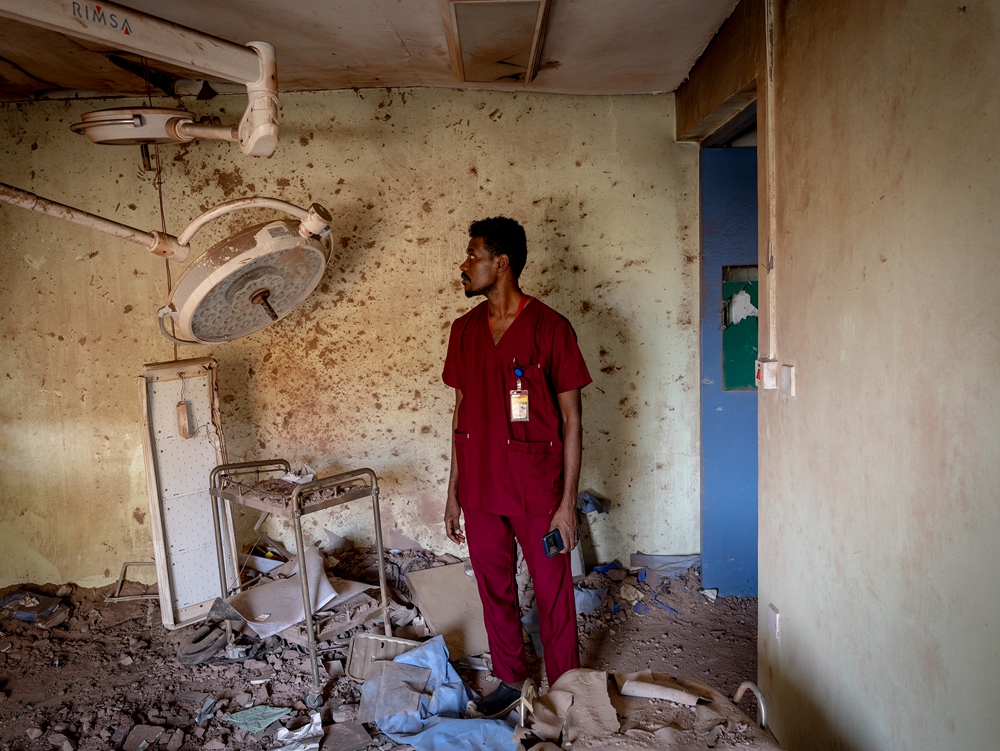
A medical worker surveys damaged equipment at Aalia Specialist Hospital. Although liberated, the area is still shelled, and only small parts of the hospital are operational.
Half of Khartoum's nine million residents have fled, with the international airport closed and widespread looting by the RSF. "A city of this size, this wealth, and nothing remains?" said banker Mohamed Eldaw. Aliaa hospital endures constant artillery, with surgeons operating by mobile phone light. In February, the military, using Iranian drones, recaptured part of the city, allowing evacuation of wounded soldiers, including Taha, who was later shot by an RSF sniper. "Guns can't solve this problem," he insists, calling for peace talks.
The Famine Ward
Amna Amin equates war with hunger after RSF fighters took over her area in Omdurman. With her husband missing and her job lost, she struggled to feed her five children. As the twins became malnourished, she rushed to Al Buluk children's hospital, the last hope for survival. Though the U.N. hasn't officially declared a famine, experts confirm it's underway in Darfur and Khartoum. Over 220,000 children risk death in the coming months, with both sides using hunger as a weapon. The army blocks visas and permits, while RSF fighters loot aid trucks and impede aid distribution. "One of the most horrific situations on Earth is on a trajectory to get far, far worse," said U.S. envoy Tom Perriello.
Hospitals are overwhelmed, with hundreds of new patients daily at Al Nau near Omdurman. Patients like Huda Adil, paralyzed by RSF shooting, and Amouna Elhadi, whose son was shot, illustrate the human toll. In contrast, Mujahid Abdulaziz, after enduring a prolonged search for medical help, reflects on lost hopes from his activist past: "Before the war, we were just dreaming. Those hopes are gone."
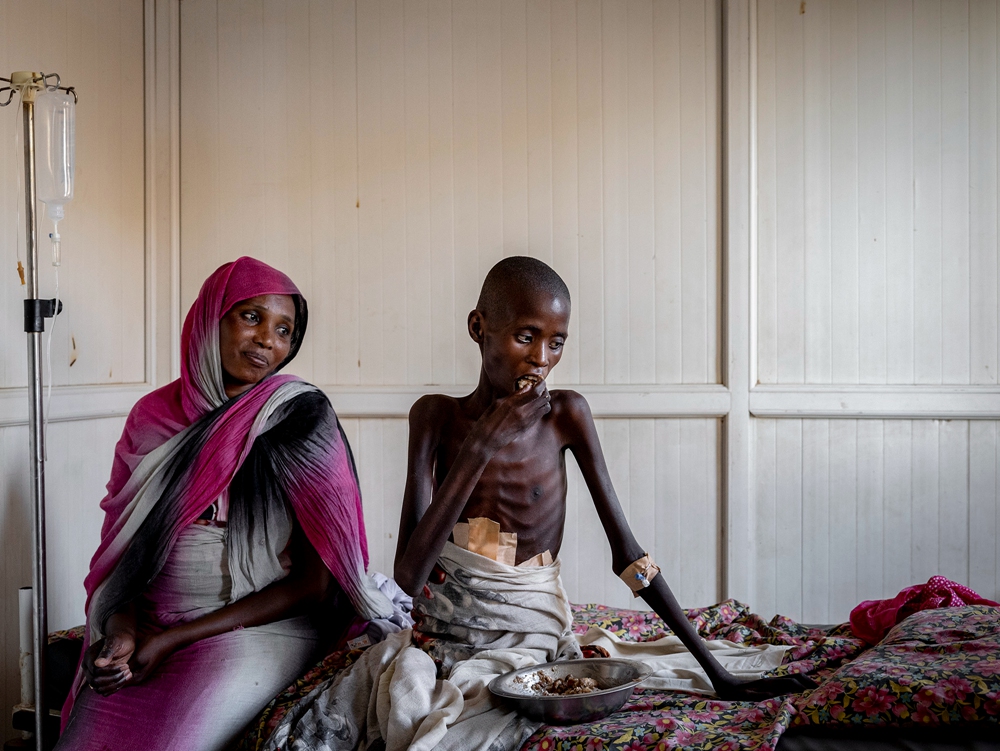
Hassan Adam, 14, eats as his mother watches at Al Nau hospital. He was shot by a member of the civilian resistance known as the "mustanfareen."
Clinging to Hope
Mudassir Ibrahim survived RSF detention, revealing evidence of torture at the national radio and television station in Omdurman. The site, now in ruins, bore signs of the RSF's brutality, including scrawled messages and destroyed archives. Despite the destruction, some residents refuse to flee. Edward Fahmy and his cousin Janette Naeim remain in the old city, despite losses and injuries, embodying Sudan's enduring religious and ethnic diversity under threat. At the Marmina Coptic Orthodox church, damage from fighting underscores the war's toll on all communities.
Local businessman Andrews Hanna witnessed RSF atrocities, including the death of a priest and the looting of his factory, forcing his family to flee. Nonetheless, community efforts like soup kitchens and Sufi devotional dances offer solace. Sheikh Elamin, a prominent Sufi leader, funds communal meals and support, earning widespread respect. "In this time of war, he's become the most popular figure in the country — period," noted analyst Suliman Baldo.
Murals of "Freedom" and acts of communal resilience, like cooking lentils amid destruction, symbolize cautious hope. "We will have a beautiful future, God willing," said Mahmoud Mustafa, a rickshaw driver, unfazed by ongoing artillery.
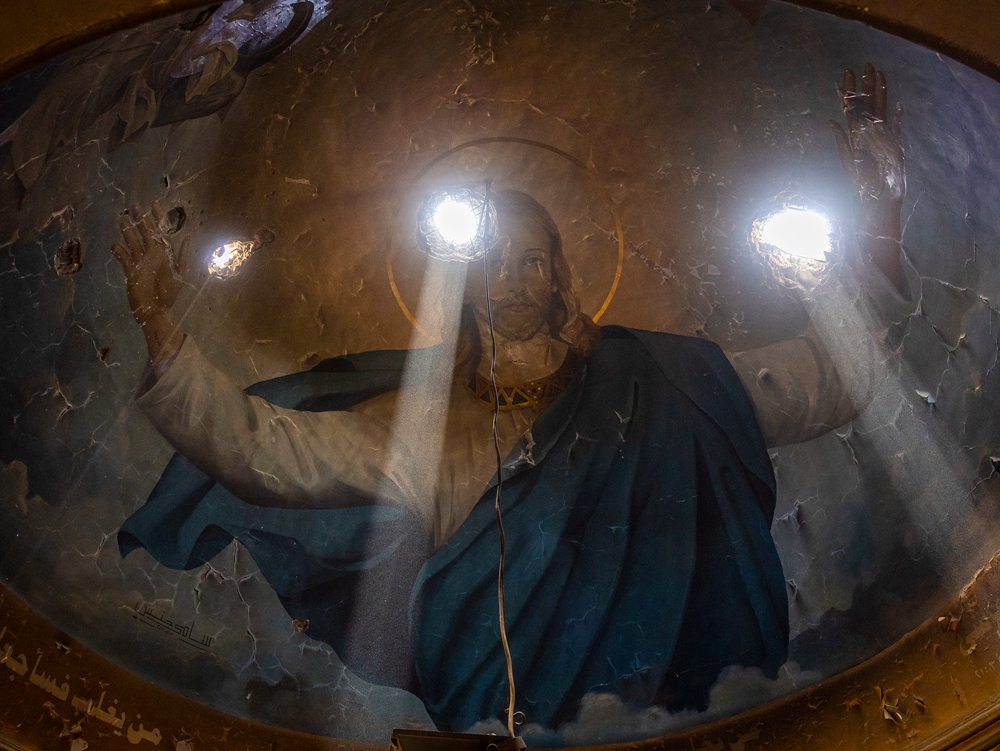
Light streams through three holes made by mortar rounds in the roof of Marmina Coptic Church, illuminating a mural of Jesus Christ.
The Weapons Store
At an abandoned RSF base, weapons with erased identifiers show foreign interference. The UAE smuggles arms to the RSF, violating a U.N. embargo, while Egypt supports the military. Iran's drones and Russia's Wagner mercenaries back both sides, complicating the conflict. Ukraine assists the Sudanese military, countering Russian-backed RSF forces. Foreign meddling undermines ceasefire efforts, pushing Sudan toward potential chaos similar to Somalia or Libya.
The conflict threatens regional stability, involving Chad, cutting oil revenues for South Sudan, and risking Ethiopian involvement. Sudanese in exile call for international intervention, but such efforts have yet to yield results. "It's sheer madness," said ex-economy minister Ibrahim Elbadawi, advocating for a U.N. peacekeeping force. "The people of Sudan demand it. Enough is enough."
Contact Us | Plan a Visit | Donate
8 Lide Road, Beitou 11259, Taipei, Taiwan
886-2-2898-9999
005741@daaitv.com
©Tzu Chi Culture and Communication Foundation
All rights reserved.
